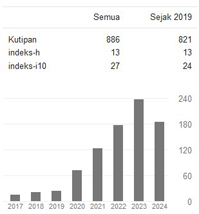Relasi Uang dan Kekuasaan dalam Konteks Pertukaran Sosial dan Dominasi Impersonal
Abstract
Abstract: This article discusses social exchange in the relationship between money and power, where money as an economic medium can direct power politically. The framework of thought used refers to Karl Marx. However, this research puts forward a method of critical thinking analysis, with a new approach to reading Marx as pioneered by the Frankfurt School. The steps taken include investigation, interpretation, and deliberation within the framework of a qualitative study. As a result, it appears that there is a development of Marx's theory of value from originally related to concrete work to be intertwined with abstract work through the mediation of money. This research also finds that the tangled threads of social exchange in relation to money and power are formed through fetishism. The worship of money as an independent value binds the existence of value to the form of money. This then manifests impersonal domination. Prioritization of money occurs at the expense or neglect of social relationships and human values. To overcome this tangle, it is necessary to reject the logic of capital, which makes everything rely on money.
Fundamentally, this rejection refers to universal, particular, and singular frames in Žižek's review. Within this framework, the rejection of singular, specific individuals or groups, particularly operative organizational programs, and protest movements with broad universal alliances must work together to drive change.
Keywords: Money, Power, Karl Marx, Social Exchange, Fetishism.
Full Text:
PDFReferences
Baldwin, David A. (1971). “Money and Power.” The Journal of Politics, 33(3), 578–614. https://doi.org/10.2307/2128274.
Brunhoff, Suzanne de. (1976). Marx on money. Translated by Maurice J. Goldbloom. New York: Urizen Books.
Ciancanelli, Penelope. (2022). “The Power of Money.” In David Fasenfest (Ed). Marx Matters, pp. 111-127. Leiden: Brill. https://doi.org/10.1163/9789004504790_007.
Davis, Ann E. (2017). Money as a Social Institution: The Institutional Development of Capitalism (1st ed.). New York: Routledge.
Dillard, D. (1987). “Money as an Institution of Capitalism.” Journal of Economic Issues, 21(4), 1623–1647. http://www.jstor.org/stable/4225941.
Graziani, Augusto. (1997). “The Marxist Theory of Money.” International Journal of Political Economy, 27:2, 26–50. http://www.jstor.org/stable/40470700.
Hancock, David. (2017). “The Currency of Desire: Libidinal Economy, Psychoanalysis, and Sexual Revolution by David Bennett.” Journal of Cultural Economy, 10:5, 479–481. https://doi.org/10.1080/17530350.2017.1335224.
Harari, Yuval Noah. (2011). Sapiens: Sejarah Singkat Umat Manusia. Terj. Yanto Musthofa. Tangerang Selatan: Pustaka Alvabet.
Harari, Yuval Noah. (2018). Money. London: Vintage.
Harvey, David. (2018). Marx, Capital, and the Madness of Economic Reason. New York: Oxford University Press.
Heinrich, Michael. (2004). “Relevance and Irrelevance of Marxian Economics.” The New School Economic Review, 1(1). Retrieved from https://nsereview.org/index.php/NSER/article/view/10.
Housel, Morgan. (2020). The Psychology of Money: Timeless Lessons on Wealth, Greed and Happiness. Hampshire: Harriman House.
Lau, Jeffrey Y. F. & John Smithin. (2002). “The Role of Money in Capitalism.” International Journal of Political Economy, 32: 3, 5–22. https://doi.org/10.1080/08911916.2002.11042878.
Lapavitsas, Costas. (2000). “Money and the Analysis of Capitalism: The Significance of Commodity Money.” Review of Radical Political Economics. Vol. 32, 4, 631–656. https://doi.org/10.1177/048661340003200404.
Lyotard, Jean-Francois. (1993). Libidinal Economy. Indiana: Indiana University Press.
Marx, Karl. (2008). “Selected Texts on Economics, History, and Social Science.” In The Philosophy of Economics: An Anthology (third edition). Daniel M. Hausman (ed). Cambridge University Press. Pp. 108–128.
Pitts, Frederick Harry. (2018). Critiquing Capitalism Today: New Ways to Read Marx. Palgrave Macmillan.
Ruggiero V. R. (2012). Beyond feelings: a guide to critical thinking (9th ed.). McGraw-Hill Higher Education.
Tan, P. (2023). Tirani Meritokrasi dan Reimajinasi Solidaritas: Sebuah Kajian Berdasarkan Perspektif Michael Sandel. Jurnal Ledalero, 22(1), 1-19. http://dx.doi.org/10.31385/jl.v22i1.332.1-19.
Thukul, Wiji. (2014). Nyanyian Akar Rumput: Kumpulan Lengkap Puisi. Jakarta: Gramedia Pustaka Utama.
Žižek, Slavoj. (2018). Like a thief in broad daylight: Power in the era of post-humanity. London: Allen Lane.
DOI: http://dx.doi.org/10.31385/jl.v22i2.373.165-185
Refbacks
- There are currently no refbacks.

This work is licensed under a Creative Commons Attribution-NonCommercial-ShareAlike 4.0 International License.

Copyright© 2015 JURNAL LEDALERO This work is licensed under a Creative Commons Attribution-NonCommercial-ShareAlike 4.0 International License.
Institut Filsafat dan Teknologi Kreatif Ledalero Jalan Trans Maumere-Ende - Sikka - Flores - Nusa Tenggara Timur - Indonesia Telp/Fax: 0382 2426535










